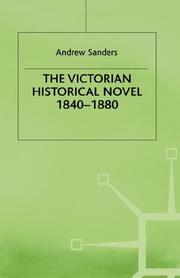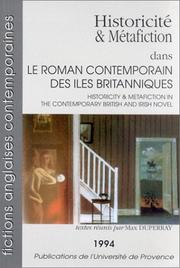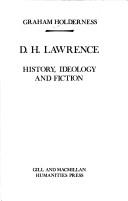| Listing 1 - 10 of 11 | << page >> |
Sort by
|
Book
ISBN: 0801811880 Year: 1971 Publisher: Baltimore, Md Johns Hopkins University Press
Abstract | Keywords | Export | Availability | Bookmark
 Loading...
Loading...Choose an application
- Reference Manager
- EndNote
- RefWorks (Direct export to RefWorks)
Historical fiction, English --- -English historical fiction --- English fiction --- History and criticism --- Fiction --- English literature --- History and criticism.

ISBN: 0333220935 Year: 1978 Publisher: London
Abstract | Keywords | Export | Availability | Bookmark
 Loading...
Loading...Choose an application
- Reference Manager
- EndNote
- RefWorks (Direct export to RefWorks)
Fiction --- English literature --- anno 1800-1899 --- English fiction --- Historical fiction, English --- Roman anglais --- History and criticism --- Histoire et critique --- -Historical fiction, English --- -English historical fiction --- History and criticism. --- -History and criticism
Book
ISBN: 0140034471 9780140034479 Year: 1978 Publisher: Harmondsworth: Penguin books,
Abstract | Keywords | Export | Availability | Bookmark
 Loading...
Loading...Choose an application
- Reference Manager
- EndNote
- RefWorks (Direct export to RefWorks)
British --- -Historical fiction, English --- English historical fiction --- British people --- Britishers --- Britons (British) --- Brits --- Fiction --- Malaya --- -Federation of Malaya --- Malaysia, Peninsular --- Malaysia, West --- Malaysia Barat --- Peninsular Malaysia --- West Malaysia --- Historical fiction, English --- English fiction --- Ethnology --- Federation of Malaya --- English literature --- British - Malaya - Fiction --- Malaya - Fiction
Book
ISBN: 1558621806 9781558621800 Year: 1994 Publisher: [Place of publication not identified] St James Press
Abstract | Keywords | Export | Availability | Bookmark
 Loading...
Loading...Choose an application
- Reference Manager
- EndNote
- RefWorks (Direct export to RefWorks)
Romance fiction, English --- Romance fiction, American --- Historical fiction, American --- Historical fiction, English --- American fiction --- English fiction --- English --- Languages & Literatures --- English Literature --- English romance fiction --- Love stories, English --- American romance fiction --- Love stories, American --- English historical fiction --- American historical fiction --- English literature --- American literature --- Dictionaries --- Bio-bibliography --- Romance-language fiction, English --- Romance-language fiction American --- Romance-language fiction, American --- Bio-bibliography. --- Dictionaries.
Book
ISBN: 1283116480 9786613116482 184615684X 1843842688 Year: 2011 Publisher: Suffolk : Boydell & Brewer,
Abstract | Keywords | Export | Availability | Bookmark
 Loading...
Loading...Choose an application
- Reference Manager
- EndNote
- RefWorks (Direct export to RefWorks)
Davis's study could scarcely be more timely or invigorating. SEAN KEILEN, College of William and Mary, Williamsburg VA. A majority of the fiction composed in England in the second half of the sixteenth century was set in the past. All the major prose writers of the period (Thomas Lodge, Sir Philip Sidney, Thomas Nashe, Thomas Deloney, Robert Greene) produced historical fiction, with settings ranging from the ancient world (as in Sidney's 'Arcadia') to the time of Henry VIII (in Nashe's 'The Unfortunate Traveller'). Yet while studies of the historical drama of the period abound, the historical bias of prose fiction has so far escaped any sort of sustained critical consideration. 'Renaissance Historical Fiction' is the first book-length study of this important topic. It argues for the complex ways in which these prose fictions engage with an idea of the past, and of their power to destabilize some of our dominant models for understanding the period of 'the Renaissance'. The wide range of texts discussed includes Lodge's 'Robin the Devil'; Greene's 'Ciceronis Amor'; John Lyly's 'Euphues and his England'; and the anonymous 'Famous History of Friar Bacon'. In addition, a chapter apiece is devoted to three key authors (Sidney, Deloney and Nashe) whose work best represents the imaginative richness and thematic complexity of the historical fiction of the late sixteenth century. Alex Davis is Lecturer in English at the University of St Andrews.
Historical fiction, English --- English historical fiction --- English fiction --- History and criticism. --- Sidney, Philip, --- Deloney, Thomas, --- Nash, Thomas, --- Nashe, Thomas, --- Nash, T. --- Nashe, T. --- Marphoreus, --- Curriknave, Cutbert, --- Curry-Knave, Cutbert, --- T. D. --- D., T. --- English prose writers. --- Henry VIII. --- ancient world. --- cultural attitudes. --- historical fiction. --- nationalistic discourse. --- patriotic debate. --- political passion. --- sixteenth century.
Book
ISBN: 9781526134363 1526134365 9781526134370 Year: 2019 Publisher: Manchester, UK : Manchester University Press,
Abstract | Keywords | Export | Availability | Bookmark
 Loading...
Loading...Choose an application
- Reference Manager
- EndNote
- RefWorks (Direct export to RefWorks)
This novel is a designedly political document. Written at the time of the Hastings impeachment and set in the period of Hastings's Orientalist government, Hartly House, Calcutta (1789) represents a dramatic delineation of the Anglo-Indian encounter. The novel constitutes a significant intervention in the contemporary debate concerning the nature of Hastings's rule of India by demonstrating that it was characterised by an atmosphere of intellectual sympathy and racial tolerance. Within a few decades the Evangelical and Anglicising lobbies frequently condemned Brahmans as devious beneficiaries of a parasitic priestcraft, but Phebe Gibbes's portrayal of Sophia's Brahman and the religion he espouses represent a perception of India dignified by a sympathetic and tolerant attempt to dispel prejudice.
India --- History --- Literature. --- Belles-lettres --- Western literature (Western countries) --- World literature --- Philology --- Authors --- Authorship --- Gibbes, Phoebe. --- India. --- Bharat --- Bhārata --- Government of India --- Ḣindiston Respublikasi --- Inde --- Indië --- Indien --- Indii︠a︡ --- Indland --- Indo --- Republic of India --- Sāthāranarat ʻIndīa --- Yin-tu --- インド --- هند --- Индия --- In literature. --- British --- Historical fiction, English. --- Literature --- Literary Studies: C 1800 To C 1900 --- LITERARY CRITICISM / European / English, Irish, Scottish, Welsh --- Colonialism & imperialism --- Fiction --- English historical fiction --- English fiction --- British people --- Britishers --- Britons (British) --- Brits --- Ethnology --- Indi --- Indii͡ --- Warren Hastings. --- colonialism. --- epistolary novel. --- nationhood. --- orientalism. --- romanticism. --- women's writing.

ISBN: 285399337X 9782853993371 Year: 1994 Publisher: Aix-en-Provence: Université de Provence,
Abstract | Keywords | Export | Availability | Bookmark
 Loading...
Loading...Choose an application
- Reference Manager
- EndNote
- RefWorks (Direct export to RefWorks)
English fiction --- Experimental fiction --- Fiction --- Historical fiction, English --- Literature and history --- Postmodernism (Literature) --- Time travel in literature --- Roman anglais --- Roman expérimental --- Roman --- Postmodernisme (Littérature) --- Irish authors --- History and criticism --- Technique --- History --- Auteurs irlandais --- Histoire et critique --- Experimental fiction, English --- Time travel in literature. --- History and criticism. --- Technique. --- -Historical fiction, English --- -Postmodernism (Literature) --- -Time travel in literature --- -Experimental fiction, English --- -English fiction --- -Literature and history --- -History and literature --- History and poetry --- Poetry and history --- English literature --- English experimental fiction --- English historical fiction --- Metafiction --- Novellas (Short novels) --- Novels --- Stories --- Literature --- Novelists --- -History and criticism --- Philosophy --- -Technique --- Irish authors. --- Roman expérimental --- Postmodernisme (Littérature) --- Fiction writing --- Writing, Fiction --- Authorship --- English fiction - 20th century - History and criticism. --- Literature and history - Great Britain - History - 20th century. --- English fiction - Irish authors - History and criticism. --- Experimental fiction, English - History and criticism. --- Historical fiction, English - History and criticism. --- Postmodernism (Literature) - Great Britain. --- Fiction - Technique. --- Litterature irlandaise de langue anglaise --- Barnes (julian), 1946 --- -20e siecle

ISBN: 0391025791 9780391025790 Year: 1982 Publisher: Dublin: Gill and Macmillan,
Abstract | Keywords | Export | Availability | Bookmark
 Loading...
Loading...Choose an application
- Reference Manager
- EndNote
- RefWorks (Direct export to RefWorks)
Historical fiction, English --- History in literature --- History and criticism --- Lawrence, D. H. --- Criticism and interpretation --- Knowledge --- History --- Great Britain --- -English historical fiction --- English fiction --- -Lawrence, D. H. --- -Criticism and interpretation --- -History --- -History in literature --- -History and criticism --- -Historical fiction, English --- Lawrence, David Herbert, --- Davison, Lawrence H. --- Lorensŭ, --- Lorensŭ, D. H., --- Lourens, D. G., --- Lorenss, D. H., --- Lorens, Deĭvid Gerbert, --- Lārensu, Ḍi. Ec., --- Lourens, Dėvid Gerbert, --- לאורנס, ד. ה. --- לאורענס --- לורנס, ד״ה --- לורנס, ד.ה., --- לורנס, ד.ה..., --- Criticism and interpretation. --- History. --- Lawrence, David Herbert --- Lorensŭ --- Lorensŭ, D. H. --- Lourens, D. G. --- Lorenss, D. H. --- Lorens, Deĭvid Gerbert --- Lārensu, Ḍi. Ec. --- Lourens, Dėvid Gerbert --- Historical fiction, English - History and criticism --- Lawrence, David Herbert, - 1885-1930 - Criticism and interpretation --- Lawrence, David Herbert, - 1885-1930 - Knowledge - History --- Great Britain - History - 20th century --- Lawrence, D.H. --- Lawrence, David Herbert, - 1885-1930
Book
ISBN: 9042032316 9789042032316 9789042032309 9042032308 Year: 2010 Publisher: Amsterdam : Rodopi,
Abstract | Keywords | Export | Availability | Bookmark
 Loading...
Loading...Choose an application
- Reference Manager
- EndNote
- RefWorks (Direct export to RefWorks)
This collection constitutes the first volume in Rodopi’s Neo-Victorian Series, which explores the prevalent but often problematic re-vision of the long nineteenth century in contemporary culture. Here is presented for the first time an extended analysis of the conjunction of neo-Victorian fiction and trauma discourse, highlighting the significant interventions in collective memory staged by the belated aesthetic working-through of historical catastrophes, as well as their lingering traces in the present. The neo-Victorian’s privileging of marginalised voices and its contestation of master-narratives of historical progress construct a patchwork of competing but equally legitimate versions of the past, highlighting on-going crises of existential extremity, truth and meaning, nationhood and subjectivity. This volume will be of interest to both researchers and students of the growing field of neo-Victorian studies, as well as scholars in memory studies, trauma theory, ethics, and heritage studies. It interrogates the ideological processes of commemoration and forgetting and queries how the suffering of cultural and temporal others should best be represented, so as to resist the temptations of exploitative appropriation and voyeuristic spectacle. Such precarious negotiations foreground a central paradox: the ethical imperative to bear after-witness to history’s silenced victims in the face of the potential unrepresentability of extreme suffering.
Psychic trauma in literature. --- Historical fiction, English --- Literature and history --- English fiction. --- Historical fiction, English. --- Historiography. --- Literature and history. --- History and literature --- History and poetry --- Poetry and history --- Historical criticism --- History --- Authorship --- English historical fiction --- English fiction --- English literature --- History and criticism. --- Criticism --- Historiography --- 1800-1901 --- Great Britain --- Great Britain. --- Anglia --- Angliyah --- Briṭanyah --- England and Wales --- Förenade kungariket --- Grã-Bretanha --- Grande-Bretagne --- Grossbritannien --- Igirisu --- Iso-Britannia --- Marea Britanie --- Nagy-Britannia --- Prydain Fawr --- Royaume-Uni --- Saharātchaʻānāčhak --- Storbritannien --- United Kingdom --- United Kingdom of Great Britain and Ireland --- United Kingdom of Great Britain and Northern Ireland --- Velikobritanii͡ --- Wielka Brytania --- Yhdistynyt kuningaskunta --- Northern Ireland --- Scotland --- Wales --- Great britain --- Historical fiction, english --- Historical fiction, english. --- Literary criticism --- Literature. --- History and criticism --- Victoria, 1837-1901 --- European --- English, irish, scottish, welsh. --- 1837-2099.
Book
ISBN: 1283366401 9786613366405 9401207240 9789401207249 9789042034372 9042034378 9781283366403 6613366404 Year: 2011 Publisher: Amsterdam : Rodopi,
Abstract | Keywords | Export | Availability | Bookmark
 Loading...
Loading...Choose an application
- Reference Manager
- EndNote
- RefWorks (Direct export to RefWorks)
Tracing representations of re-imagined Victorian families in literature, film and television, and social discourse, this collection, the second volume in Rodopi’s Neo-Victorian Series, analyses the historical trajectory of persistent but increasingly contested cultural myths that coalesce around the heterosexual couple and nuclear family as the supposed ‘normative’ foundation of communities and nations, past and present. It sheds new light on the significance of families as a source of fluctuating cultural capital, deployed in diverse arenas from political debates, social policy and identity politics to equal rights activism, and analyses how residual as well as emergent ideologies of family are mediated and critiqued by contemporary arts and popular culture. This volume will be of interest to researchers and students of neo-Victorian studies, as well as scholars in contemporary literature and film studies, cultural studies and the history of the family. Situating the nineteenth-century family both as a site of debilitating trauma and the means of ethical resistance against multivalent forms of oppression, neo-Victorian texts display a fascinating proliferation of alternative family models, albeit overshadowed by the apparent recalcitrance of familial ideologies to the same historical changes neo-Victorianism reflects and seeks to promote within the cultural imaginary.
Historical fiction, English --- English fiction --- Literature and history --- English fiction. --- Historical fiction, English. --- Literature and history. --- History and literature --- History and poetry --- Poetry and history --- English historical fiction --- English literature --- History --- History and criticism. --- 1900-2099 --- Great Britain. --- Anglia --- Angliyah --- Briṭanyah --- England and Wales --- Förenade kungariket --- Grã-Bretanha --- Grande-Bretagne --- Grossbritannien --- Igirisu --- Iso-Britannia --- Marea Britanie --- Nagy-Britannia --- Prydain Fawr --- Royaume-Uni --- Saharātchaʻānāčhak --- Storbritannien --- United Kingdom --- United Kingdom of Great Britain and Ireland --- United Kingdom of Great Britain and Northern Ireland --- Velikobritanii͡ --- Wielka Brytania --- Yhdistynyt kuningaskunta --- Northern Ireland --- Scotland --- Wales --- Steampunk culture. --- Families. --- Sex role. --- Gender expression. --- Expression, Gender --- Sex (Psychology) --- Sex role --- Family --- Families --- Family life --- Family relationships --- Family structure --- Relationships, Family --- Structure, Family --- Social institutions --- Birth order --- Domestic relations --- Home --- Households --- Kinship --- Marriage --- Matriarchy --- Parenthood --- Patriarchy --- Neo-Victorian culture --- Neo-Victorianism (Subculture) --- Steampunk subculture --- Subculture --- Social aspects --- Social conditions --- Gender role --- Sex differences (Psychology) --- Social role --- Gender expression --- Sexism --- Gender roles --- Gendered role --- Gendered roles --- Role, Gender --- Role, Gendered --- Role, Sex --- Roles, Gender --- Roles, Gendered --- Roles, Sex --- Sex roles
| Listing 1 - 10 of 11 | << page >> |
Sort by
|

 Search
Search Feedback
Feedback About UniCat
About UniCat  Help
Help News
News